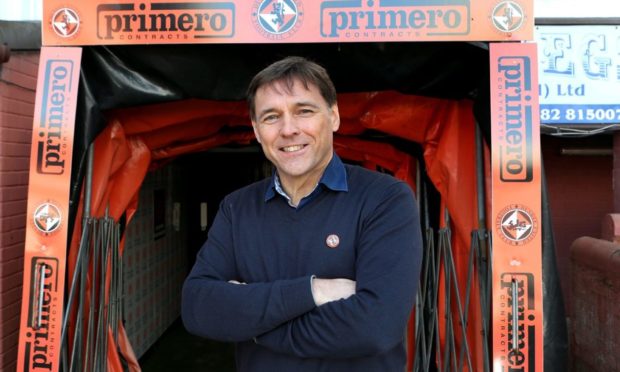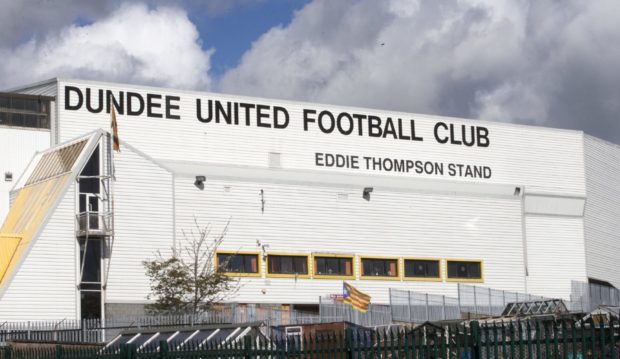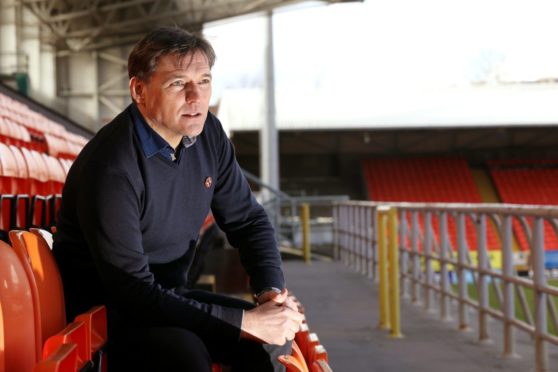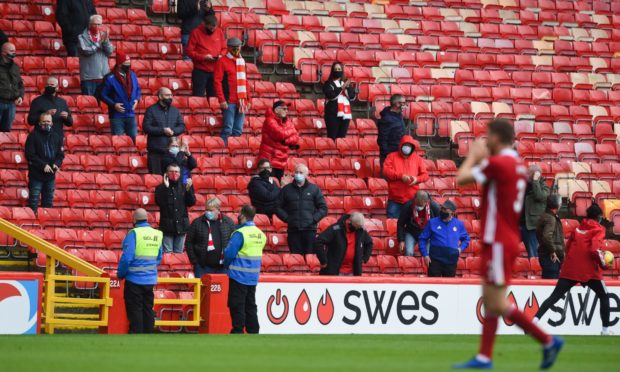Derek Bond says Covid-19 has robbed Dundee United of a potential break-even season.
The Tannadice finance director’s task – attempting to balance the books during an unprecedented 12-month income drought – has proved extremely challenging.
The club’s new accounts, which will cover the 2019/20 promotion season, are in line to be published – and Bond admits they won’t make for good reading.
But he insists that is largely because a long-term strategy of investment into the academy has not yet recouped.
That infrastructural spending, along with cash sunk into staff changes and readying the squad for a crack at promotion, saw United’s wage to turnover ratio soar to 133% in 2018/19.
Bond knows that can’t continue – but he says the only thing that cost the club their first break-even campaign of Mark Ogren’s ownership, which this season’s budgets had projected, was the refusal to allow fans back into stadiums.
Plugging the shortfall has required help from the owner, players and staff to accept pay cuts and fans to dig deep.
But with the well-funded Tannadice academy project now kicking into high gear, Bond is hopeful the club will soon be rewarded for their commitment to youth development.
“It was never a long-term strategy (to run wages to turnover at a high level). That couldn’t be a strategy for anybody,” he explained.
“It was a mixture of one-off costs coming into the club, a deliberate investment in the squad and also the academy.
“The academy was so badly run and under-invested. A big increase in the wage bill has been the academy – part-time and full-time coaches, medical people.
“We’ve very quickly got the academy up to elite status, which is almost unheard of. We’re up punching with Rangers and Celtic in terms of young players.
“Look at the players coming out of there now. If you sell one of those every year, the academy has paid for itself.
“We’ve had 10 academy graduates make debuts this season. That’s the fact a lot of people miss.
“The investment in the academy has probably been five to six-hundred-thousand pounds. And that’s not a one-off cost, that’s an annual investment.
“We’ve deliberately, even through Covid, kept the place going. Some of the guys are working flexi-furlough but they’re still in working with the boys.
“That’s a hugely, hugely important part of the club.
“But when your turnover is down and you’re investing in the academy without getting an immediate return, it’s obviously going to be reflected in the accounts.”
Break-even
The financial figures relating to the 2018/19 season have seen United come in for criticism for overspending.
But Bond insists heavy investment was a deliberate strategy under the club’s then new ownership – and Covid-19 was the unforeseeable spoiler.
“The accounts for 2019/20 won’t make good reading either,” he said.
“But they’ve been influenced by Covid, they’ve also been influenced by further investment in the playing squad to try to get promoted, then be good enough to finish in the top six of the Premiership without further investment the following summer.
“The money spent in 2019/20 was spent with a view toward the Premiership.
“If it wasn’t for Covid, our budget for this season was pretty much a break-even situation, based on us having already spent money to strengthen the squad and being in the Premiership with much more projected income from TV, gate receipts and hospitality.
“That was always the strategy. Covid has knocked it for six.
“When we were doing the budget for this financial year, which would have been around May of last year, when we came out of that initial lockdown, things were looking positive around getting fans into games.
“There were positive noises, there were fans getting into games in England, I remember watching games in Germany where there were thousands of fans in stadiums.
“So we set a budget this year based on fans starting to come back in in October, which we thought was realistic and achievable.
“Particularly this year, with us being back in the Premiership, the budget was completely different to the previous year in the Championship, because you’re talking about having Celtic, Rangers, Hearts, Hibs and Aberdeen all bringing significant numbers of fans versus the last season, when, with the likes of Alloa and Inverness, you could sit and count them in the stand.
“The budget is set around that. The process is, you start with income – and gate receipts are a huge part of that.
“If we’re budgeting for gate receipts to start coming in around October, November, a Celtic or Rangers game will generate a couple of hundred thousand pounds in gate receipts alone.
“That’s a huge part of our budget and, obviously, it hasn’t happened.”
Insurance policy
Fortunately, United are covered by a business interruption insurance policy that protects them from the specific circumstances the club has just endured – and is set to pay out.
For Bond, that is a huge positive as he begins preparing a budget for next season that could yet be further boosted by fans.
He explained: “Our policy was quite clear that we were covered, so we’ve been working on this for a long while.
“We haven’t had a pay out yet but we’re hoping to get substantial pay outs in the coming weeks and months that will help fill the gap.
“If that happens, clearly, and we can get fans on board with season ticket renewals, next season will hopefully be a fairly normal season, budget wise.”



